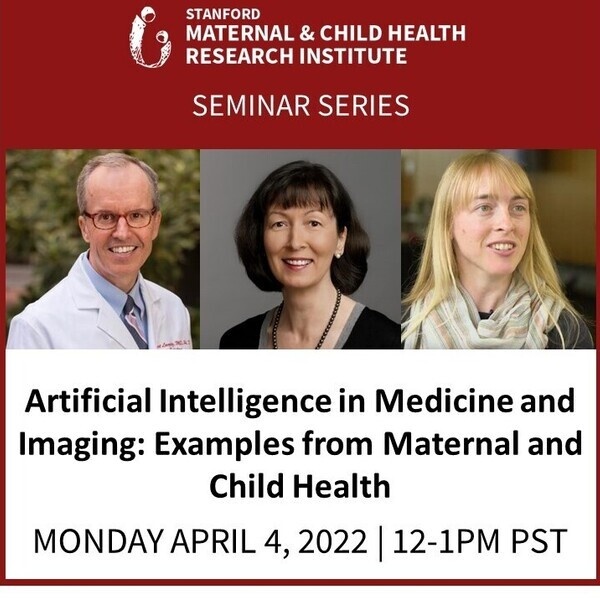Stanford’s Center for Artificial Intelligence in Medicine and Imaging (AIMI) is increasing engagement around the use of artificial intelligence (AI) and machine learning to build a better understanding of data on women’s and children’s health, according to AIMI Director and radiology professor Curt Langlotz.
Langlotz explained that, while AIMI initially focused on applying AI to medical imaging, it has since expanded its focus to applications of AI for other types of data, such as electronic health records.
Specifically, the center conducts “interdisciplinary machine learning research that optimizes how data of all forms are used to promote health,” Langlotz said during a Monday event hosted by the Maternal and Child Health Research Institute (MCHRI). “And that interdisciplinary flavor is in our DNA.”
The center now has over 140 affiliated faculty across 20 departments, primarily housed in the engineering department and the school of medicine at Stanford, according to Langlotz.
AIMI has four main pillars: building an infrastructure for data science research, facilitating interdisciplinary collaborations, engaging the community and providing funding.
The center provides funding predominantly through a series of grant programs. Langlotz noted that the center awarded seven $75,000 grants in 2019 to fund mostly imaging projects, but it has since diversified funding to go toward projects investigating other forms of data, such as electronic health records. AIMI also collaborated with the Human-Centered Institute for Artificial Intelligence (HAI) in 2021 to give out six $200,000 grants, he added.
Outside of funding, AIMI hosts a virtual symposium on technology and health annually and has a health-policy committee that informs policymakers on the intersection between AI and healthcare. Furthermore, the center pairs industry partners with laboratories to work on larger research projects of mutual interest as part of the only industry affiliate program for the school of medicine, Langlotz added.
“Industry often has expertise that we don’t, so they may have expertise on bringing products to markets as they may know what customers are looking for,” Langlotz said. “And if we’re building these kinds of algorithms, we really would like them to ultimately reach patients.”
Heike Daldrup-Link, a professor of radiology and pediatrics, and Alison Callahan, a research scientist at the Center for Biomedical Informatics, shared their research funded by the AIMI Center that rests at the intersection of computer science and medicine.
Daldrup-Link’s research involves analyzing children’s responses to lymphoma cancer therapy with a model that examines tumor sites using positron emission tomography (PET) scans. These scans reveal the metabolic processes occurring within tissues and organs, according to Daldrup-Link. The scans also serve as a good source to build algorithms because there are at least “270,000 scans per year” from lymphoma patients, resulting in a large amount of available data.
Callahan is building AI models to extract information from electronic health records to learn more about pregnancy and postnatal health outcomes. She explained that much of the health data available from records is currently unstructured, meaning it does not conform to a database or simple model. Still, “AI methods can really shine in extracting valuable information from unstructured content like clinical texts or notes,” she said.
Callahan and Daldrup-Link are just two examples of researchers who use AI and machine learning methods to produce novel research on women’s and children’s health. Developing new methods such as these are important in solving complex problems related to the field of healthcare, according to Langlotz.
“If you’re working on difficult and interesting applied problems that are clinically important, you’re likely to encounter the need to develop new and interesting methods,” Langlotz said. “And that’s proven true for us.”
